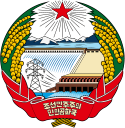- Government of North Korea
-
North Korea 
This article is part of the series:
Politics and government of
North Korea
- Eternal President
- Supreme Leader
- Supreme People's Assembly
- Chairman of the Presidium
- National Defence Commission
- Chairman
- First Vice Chairman
- vacant
- Government
The North Korean government is the executive branch of the state, according to the Constitution of North Korea.[1] In practice, the highest decisions are made by the National Defence Commission of North Korea which is led by its Chairman Kim Jong-il.
North Korea's Songun "Military First" policy elevates the Korean People's Army within North Korea as an organization and as a state function, granting it the primary position in the North Korean government and society. It guides domestic policy and international interactions.[2]
Contents
Institutions
The government is confirmed by the Supreme People's Assembly (SPA). The SPA chooses a premier who appoints three vice premiers and the government's ministers. The government is dominated by the ruling Workers' Party of Korea (WPK) and has been since North Korea's inception in 1948.
The Cabinet now has the right to supervise and control the Local People’s Committee (LPC) with regard to local economies and administration. As the State Administrative Council (SAC) was replaced by the Cabinet, the Local Administrative and Economic Committee (LAEC) was abolished and its functions regarding local politics transferred to the LPC.
A party chief secretary no longer concurrently holds the post of LPC chairman, which has been taken over by a former LAEC chairman. Thus, the LPC is theoretically independent of the local party and is under the control of the Cabinet. The status of the LPC as the local executive organ, in principle, became higher than before.
The Economist Intelligence Unit, lists North Korea in last place as an authoritarian regime in its Democracy Index assessing 168 countries.[3]
Cabinet
- Office of the Premier of the DPRK
- Office of the Vice Premier of the DPRK
- Ministry of Finance
- Ministry of the People's Armed Forces
- Ministry of Foreign Affairs
- Ministry of People's Security
- Ministry of Education
- Ministry of Public Health
- Ministry of Post and Telecommunications
- Ministry of Land and Marine Transportation
- Ministry of Railways
- Ministry of Commerce
- Ministry of Labour
- Ministry of Culture
- Ministry of City Management
- Ministry of Capital City Construction Development
- Ministry of Metal Industry
- Ministry of Electronics Industries
- Ministry of Construction and Building-Materials Industries
- Ministry of Agriculture
- Ministry of Forestry
- Ministry of Fisheries
- Ministry of Oil Industry
- Ministry of Land and Environment Preservation
- Ministry of State Construction Control
- Ministry of Procurement and Food Administration
- Ministry of State Inspection
- Ministry of Physical Culture and Sports Affairs
- State Planning Commission
- Director of the Central Statistic Bureau
- President of the Central Bank of the DPRK
- President of the National Academy of Sciences
- Chief Secretary of the Cabinet
- Office of the President of the Cabinet Political Bureau
- Office of the Vice President of the Cabinet Political Bureau
See also
Notes
- ^ ""Naenara" `official' press agency - Politics in Korea - THE STATE AND POLITICAL SYSTEM - Constitution" (in English). Naenara. 2007. http://www.kcckp.net/en/great/state_pol.php. Retrieved 2007-10-09.
- ^ Alexander V. Vorontsov, "North Korea's Military-First Policy: A Curse or a Blessing?" Brookings Institution, 26 May 2006
- ^ "Economist Intelligence Unit democracy index 2006" (in English) (PDF). Economist Intelligence Unit. 2007. http://www.economist.com/media/pdf/DEMOCRACY_TABLE_2007_v3.pdf. Retrieved 2007-10-09.
Governments of Asia Sovereign
states- Afghanistan
- Armenia
- Azerbaijan
- Bahrain
- Bangladesh
- Bhutan
- Brunei
- Burma (Myanmar)
- Cambodia
- People's Republic of China
- Cyprus
- East Timor (Timor-Leste)
- Egypt
- Georgia
- India
- Indonesia
- Iran
- Iraq
- Israel
- Japan
- Jordan
- Kazakhstan
- North Korea
- South Korea
- Kuwait
- Kyrgyzstan
- Laos
- Lebanon
- Malaysia
- Maldives
- Mongolia
- Nepal
- Oman
- Pakistan
- Philippines
- Qatar
- Russia
- Saudi Arabia
- Singapore
- Sri Lanka
- Syria
- Tajikistan
- Thailand
- Turkey
- Turkmenistan
- United Arab Emirates
- Uzbekistan
- Vietnam
- Yemen
States with limited
recognition- Abkhazia
- Nagorno-Karabakh
- Northern Cyprus
- Palestine
- Republic of China (Taiwan)
- South Ossetia
Dependencies and
other territoriesCategories:
Wikimedia Foundation. 2010.
